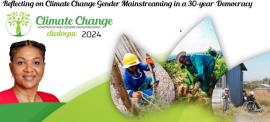
Government has affirmed its commitment to addressing gender equality in relation to women being disproportionately affected by the impacts of climate change through policy, legislation and action.
Addressing the Climate Change Adaptation and Gender Mainstreaming Dialogue in Pretoria, Deputy Minister of Forestry, Fisheries and the Environment, Bernice Swarts, said the increased burden on women necessitates that government makes gender equality a central tenet of the climate change strategies.
“Our National Climate Change Response White Paper explicitly recognises the special needs and circumstances of rural women, who are among the hardest hit by climate change.
“Gender mainstreaming is not just a theoretical concept but a practical necessity. It means integrating gender considerations into all aspects of climate change adaptation strategies, policies, and programmes.
“By doing so, we ensure that the unique experiences and contributions of women are not only recognised but are also harnessed in ways that promote sustainable development,” the Deputy Minister said on Wednesday.
She said the National Environmental Management Act (NEMA) acknowledges the vital role of women in environmental management.
“However, we must do more than just acknowledge: we must act! It is through inclusive approaches that we can begin to build resilience, reduce vulnerabilities, and address the inequalities that climate change exacerbates.
“While we have made progress in establishing gender-sensitive policies, the challenge lies in effectively implementing these policies on the ground. We must continue to share best practices, success stories, and innovative approaches that have worked in different sectors and regions,” Swarts said.
The Deputy Minister noted that gender inequality has long been a global issue.
“Despite efforts to address these inequalities through international frameworks like the United Nations Charter, the Universal Declaration of Human Rights, and the Beijing Declaration and Platform for Action, the reality is that many women, especially in developing nations, remain disproportionately affected by the impacts of climate change.
“Women, particularly those in rural areas, are among the most vulnerable when climate disasters strike. They often face greater challenges accessing resources such as water and food due to droughts, floods, and other extreme weather events,” Swarts said. -SAnews.gov.za


